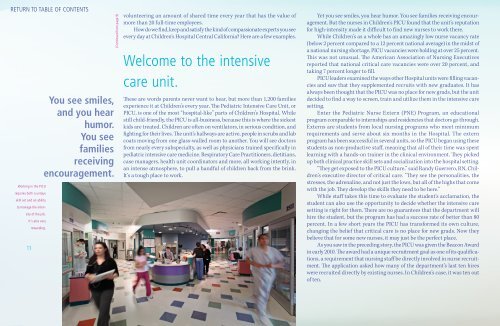Wellness, revolutionized. - Children's Hospital Central California
Wellness, revolutionized. - Children's Hospital Central California
Wellness, revolutionized. - Children's Hospital Central California
You also want an ePaper? Increase the reach of your titles
YUMPU automatically turns print PDFs into web optimized ePapers that Google loves.
RETURN TO TABLE OF CONTENTS<br />
Working in the PICU<br />
requires both a unique<br />
skill set and an ability<br />
to manage the inten-<br />
sity of the job.<br />
It’s also very<br />
11<br />
rewarding.<br />
You see smiles,<br />
and you hear<br />
humor.<br />
You see<br />
families<br />
receiving<br />
encouragement.<br />
(Continued from page 9)<br />
volunteering an amount of shared time every year that has the value of<br />
more than 20 full-time employees.<br />
How do we find, keep and satisfy the kind of compassionate experts you see<br />
every day at Children’s <strong>Hospital</strong> <strong>Central</strong> <strong>California</strong>? Here are a few examples.<br />
Welcome to the intensive<br />
care unit.<br />
These are words parents never want to hear, but more than 1,200 families<br />
experience it at Children’s every year. The Pediatric Intensive Care Unit, or<br />
PICU, is one of the most “hospital-like” parts of Children’s <strong>Hospital</strong>. While<br />
still child-friendly, the PICU is all-business, because this is where the sickest<br />
kids are treated. Children are often on ventilators, in serious condition, and<br />
fighting for their lives. The unit’s hallways are active, people in scrubs and lab<br />
coats moving from one glass-walled room to another. You will see doctors<br />
from nearly every subspecialty, as well as physicians trained specifically in<br />
pediatric intensive care medicine. Respiratory Care Practitioners, dietitians,<br />
case managers, health unit coordinators and more, all working intently, in<br />
an intense atmosphere, to pull a handful of children back from the brink.<br />
It’s a tough place to work.<br />
Yet you see smiles, you hear humor. You see families receiving encouragement.<br />
But the nurses in Children’s PICU found that the unit’s reputation<br />
for high-intensity made it difficult to find new nurses to work there.<br />
While Children’s as a whole has an amazingly low nurse vacancy rate<br />
(below 2 percent compared to a 12 percent national average) in the midst of<br />
a national nursing shortage, PICU vacancies were holding at over 25 percent.<br />
This was not unusual. The American Association of Nursing Executives<br />
reported that national critical care vacancies were over 20 percent, and<br />
taking 7 percent longer to fill.<br />
PICU leaders examined the ways other <strong>Hospital</strong> units were filling vacancies<br />
and saw that they supplemented recruits with new graduates. It has<br />
always been thought that the PICU was no place for new grads, but the unit<br />
decided to find a way to screen, train and utilize them in the intensive care<br />
setting.<br />
Enter the Pediatric Nurse Extern (PNE) Program, an educational<br />
program comparable to internships and residencies that doctors go through.<br />
Externs are students from local nursing programs who meet minimum<br />
requirements and serve about six months in the <strong>Hospital</strong>. The extern<br />
program has been successful in several units, so the PICU began using these<br />
students as non-productive staff, meaning that all of their time was spent<br />
learning with a hands-on trainer in the clinical environment. They picked<br />
up both clinical practice skill sets and socialization into the hospital setting.<br />
“They get exposed to the PICU culture,” said Randy Guerrero, RN, Children’s<br />
executive director of critical care. “They see the personalities, the<br />
stresses, the adrenaline, and not just the lows, but all of the highs that come<br />
with the job. They develop the skills they need to be here.”<br />
While staff takes this time to evaluate the student’s acclamation, the<br />
student can also use the opportunity to decide whether the intensive care<br />
setting is right for them. There are no guarantees that the department will<br />
hire the student, but the program has had a success rate of better than 80<br />
percent. In a few short years the PICU has transformed its own culture,<br />
changing the belief that critical care is no place for new grads. Now they<br />
believe that for some new nurses, it may just be the perfect place.<br />
As you saw in the preceding story, the PICU was given the Beacon Award<br />
in early 2010. The award had a unique recruitment goal as one of its qualifications,<br />
a requirement that nursing staff be directly involved in nurse recruitment.<br />
The application asked how many of the department’s last ten hires<br />
were recruited directly by existing nurses. In Children’s case, it was ten out<br />
of ten.


